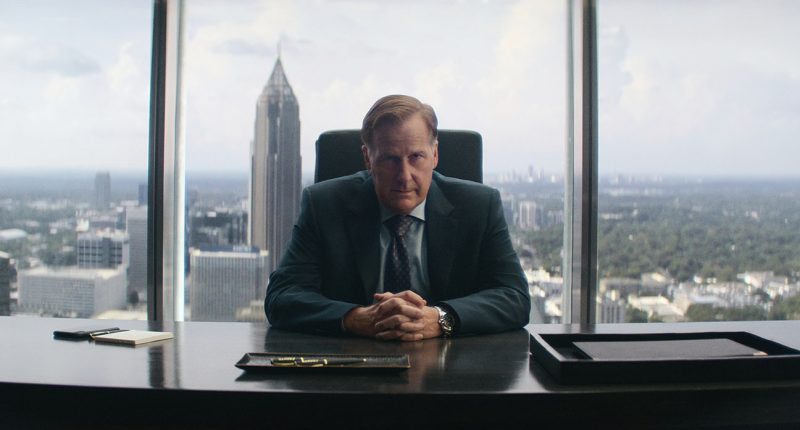Jeff Daniels says he isn’t giving much thought to metaphor in his performances. But his recent role as Charlie Croker in Netflix’s A Man in Full was swimming in them.
Based on Tom Wolfe’s 1998 novel of the same name — which shook up Atlanta’s high society, thanks to Croker’s striking likeness to the city’s middle-aged Southern (and conservative) business elite — the limited series from David E. Kelley, which released on Netflix in early summer, brought the author and journalist’s tale of race and class disparity into the modern era.
In the series, Daniels portrays the former youthful football star turned aging Atlanta business titan, whose questionable business dealings and ego have landed him in a spat with his financiers and is facing bankruptcy. As vultures begin to swarm the powerful real estate mogul, one particularly emasculated and vengeful loan officer, Raymond Peepgrass (Tom Pelphrey), sets out on to be the match that lights the fire that will burn down Croker’s empire.
As Croker attempts to stave off his fall from grace, his battle becomes entwined with his ex-wife Martha Croker (Diane Lane); Joyce Newman (Lucy Lui), a beauty company owner with a secret that could topple one of the city’s most powerful men; Wes Jordan (William Jackson Harper), Atlanta’s mayor looking to get a leg up on his challenger in his re-election bid; and his secretary, Jill Hensley (Chanté Adams), whose husband has been arrested and jailed for assaulting an officer who brutalized him during a traffic stop, and who is being represented by Roger White (Aml Ameen), a loyal attorney for Croker Industries.
It was a timely tale about the vanity of man when Wolfe first wrote it. And it translates with uncomfortable effortlessness to the present, touching on police brutality, #MeToo, a growing class divide and corporate corruption. As some viewers see it, even Croker shares similarities with a former U.S. president.
When speaking to The Hollywood Reporter recently, Daniels said he entrusted Kelley and his directors, who included Regina King, to help sell the story beneath the story for viewers. Along with working with titans Kelley and King, the Emmy-winning actor shares how he came ready to set to feed off his talented co-stars to deliver the biting satire, the metaphor of that robotic knee replacement and whether Charlie ended the story as a villain or a winner.
***
You’ve worked with a lot of prolific writers across your career. David E. Kelley is one of them. What about him and his shaping of this universe appealed to you when taking the role?
When you get a David E. Kelley [show], it’s the same writers room as, in my case, Scott Frank and Aaron Sorkin and Adam Rapp, way back to Lanford Wilson. Even Woody Allen and Gary Ross. I’ve had Noah Baumbach in Squid and the Whale. It’s that singular voice that all these people have. I’ve always liked movies or TV shows that honored the writing and the writer. I go back to Paddy Chayefsky and Network. When William Holden and Faye Dunaway are in that bedroom screaming at each other, there are three people in that room and the third one is Paddy Chayefsky.
So, my job in A Man in Full is to play Charlie Croker, and to believe what he believes and think how he thinks. His version of what’s right and what’s wrong — that’s the only thing that matters. It’s up to David and Regina King, the director, and Tommy Schlamme, the director, to steer me into that wall face-first. By the end of it, maybe in Charlie’s case, he’s changed at least a little bit. But Tom Wolfe wrote the book in the late ’90s, and David did a great job of dropping it into 2024. Because a lot of what the book dealt with and what David deals with is still very relevant today.
You had the opportunity to work with Regina King, who directed you for several episodes. She’s a talented director but also an actor who has been in your place. What was it like working with her?
Look, she’s got an Oscar and she’s sitting on the other side of the video village, so I know she’s got my back. The same thing with Tommy. They’re professional directors who can see the scene from 30,000 feet, which I don’t. I’m seeing Charlie Croker. But in Regina’s case, she can get inside my head as an actor, she can see the engine working under the hood, the choices — what I’m doing and why I’m doing it. Directors think they have to direct and if you get good actors in there, and certainly in my case, with Bill Camp, Tom Pelphrey — everybody on the show, to be honest — they come in prepared, and they rehearse themselves up. You show the director that in take one, take two. If there are adjustments to be made, terrific.
Robert Altman did that. Clint Eastwood did that. Woody did that. They cast it. Ninety percent of it is casting the right actor who’s going to work on it and come in with a plan. Then, on the occasion where [Regina] or Tommy would step in and go, “Maybe this or that,” you go, “OK.” Because if they’re going to give you the freedom to show them what you think it is, then when they ask for an adjustment after take two or three, honor that and then try to execute that. At the end of the day, what you want are options in the editing room. You want to give Regina and Tommy and others that, “Well, he was a little softer on it here, so let’s use that one because it flows better with what Bill Camp was doing.” But, she was great. I knew she had me and that she knew what I was doing. She did nothing but encourage me by kind of just going, “That’s great. Good. Let’s move the camera.” That’s a rave review from Regina.

Tom Pelphrey as Raymond Peepgrass with Jeff Daniels as Charlie Croker in A Man in Full.
Mark Hill/Netflix
Charlie’s knee feels like a metaphor for his internal decay and of the rot growing around his entire situation. Then he gets it replaced, and he gets a new lease. But instead of the message that replacing his disabled knee with an adaptive one erases all his personality and professional troubles, he still succumbs to his own worst impulses. How did you think about portraying the evolution of Charlie’s physicality in terms of his knee, and what does it say about his journey?
I’ve done really well not thinking too deeply about metaphors. That’s why I don’t direct, because that’s their job. I just knew that Charlie knew that his knee hurt, and that was him falling apart. He wanted the best new knee he could get, so he could basically almost play football again, like he did 40 years ago. But I agree that’s an example of falling apart. It’s a knee that he can’t control. I don’t know what the metaphor is for that, but there’s a scene in the hospital, and Tommy Schlamme was directing that episode, and Tommy has had his knee replaced. So it was, “Am I limping enough? Is it painful enough?”
Tommy was all over me about how I need a little more pain in the knee this time, because Tommy knew. He said when you’re coming out of surgery, you’ve just gotten a new 20-year-old knee, but it’s also a remote control knee that the doctor is showing you can bend if you press a remote. It helps you with rehab. But Tommy said, “Remember, you’re still on morphine.” So here’s this larger-than-life character under the fog of morphine, and the doctors showing him this miracle that’s happening in his right knee. And all I could do was go, “Oh, God,” and every time, I cracked up. I could hear Tommy and everybody over at the video village cracking up, and I go, “No, I got it. Give me the cue again. Give me the cue again, I can do this.” (Laughs) It was so funny to me. It still cracks me up.
There are a lot of parallels between characters, and one of the clearest by the end feels like Charlie and Conrad Hensley’s (Jon Michael Hill). There’s this real “I’m standing on my principles and not going to back down” thing happening, but it’s manifesting completely differently for each of the men. Can you talk about working with your cast on shaping these journeys and whether you think Charlie, arguably a bad man, came out a winner or hero like Hensley despite his demise?
I do not sit around with casts on any project and talk about our collective journey. I love to make it happen in front of the camera for the first time in take one. In Clint Eastwood movies, that’s where I learned it. You get one take, and then Clint’s moving the camera. So that’s where you learn to hit it on one. But television, because they have less money, and they need to squeeze more in every day, if you don’t hit it on one or two, they’re going to edit it later and they’re moving. You got to hit it. So if we aren’t going to rehearse, and we have to hit it on one and two, let’s live dangerously and just roll. Then if the actors know their lines, and they have a plan going in, it collides. I don’t really want to know what Bill Camp has planned. I don’t want to know what Tom Pelphrey is going to do. I want to see it in front of the camera so that I can react to it. Half of your performance is in the other actor when you work like this. It’s freeing in a way, but you’ve got to do the work on your end to know what you’re doing.
As far as the good guy, bad guy stuff, I think Charlie becomes aware that maybe he could have lived better. He could have treated people better. He maybe atones a little bit, at least with his son and starts to with his wife. I think in the beginning there’s thinking that maybe in the last years of his life, he can live a little bit better. He won’t be as rich, but you know what? She still loves him and he’s kind of come to Jesus with his son a little bit. Charlie kind of introduces himself to the human being that lives deep down inside him that he basically put in the back closet and locked the door. That’s the start of it. Then his need to take revenge or go after the people who have wronged him overtakes him. Again, he runs face first into the wall at the end, basically. So he’s not the hero at the end. I don’t know who is — certainly, Roger is. Conrad might be. But you know, every story has got to have some bad guys.
A Man in Full is now streaming on Netflix.
Also Read More: World News | Entertainment News | Celebrity News









